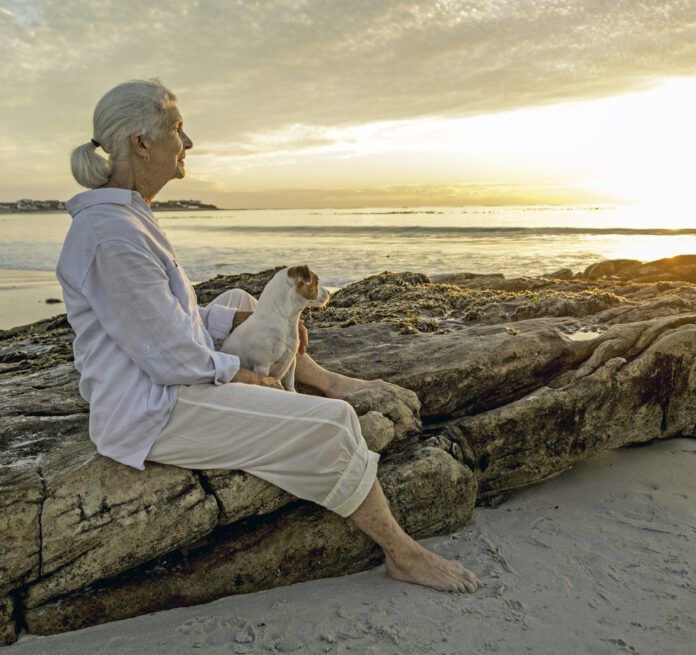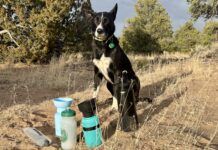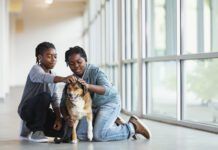Many well-meaning people believe the best dogs for seniors are low-maintenance dog breeds that don’t require a lot of grooming or exercise. And, while there’s logic here, it’s not a fact cast in stone.
First, no one wants to be told, “You’re too old to own a dog.” I am 73 years old and have always owned Shelties, which are little dogs. When I recently fell in love with a Golden Retriever puppy, I was told, “You’re too old for a big dog.” What?
OK, there were times when I thought these well-meaning friends were right. Having three Shelties, a large puppy, and two knee replacements in the same year took some managing, but it was completely worth it. And, you may run into age prejudice when looking for a new dog, but if you put all the pieces in place – especially with the dog’s best future in mind – there’s no reason a senior person can’t have a dog. Dogs are wonderful companions.
To find the best dog for a senior, determine what the older adult can and cannot physically do. Older people who walk dogs do have an elevated risk of injury, according to a study on emergency department visits. But that doesn’t mean seniors must only have little dogs – I don’t!
Take your time when choosing and, if it’s possible, consider a foster-to-adopt situation from a reputable rescue organization. With a foster situation, you get to live with the dog and take your time deciding if this dog is a fit for you. This way, you don’t get stuck in a heartbreaking situation where the dog needs far more exercise or training than you can manage, and you don’t know what to do for him.
Breeds for Seniors
Certainly, natural dominant characteristics in each dog breed should be considered if you’re specifically looking for a low-maintenance dog breed or a low-energy dog. Most dog experts would agree, for example, that:
- Terriers have lots of energy
- Shelties bark a lot
- Border Collies need a job
- Brachycephalic dogs are at an increased risk for many illnesses
- Labrador and Golden retrievers are sometimes quiet at home but come to life in the field
- Mixed breeds can be the best or the worst of its varied lineage. For example, I have seen crazy and quiet Doodles.
But these are generalities. Each dog is an individual.

If you’re determined to get a certain breed, researching the breed’s likely characteristics is important. If the desired dog is a puppy, talk with breeders. Each puppy is an individual. I do temperament tests for many breeders when their puppies are 49 days old. At this age, the pups have not yet been influenced by the outside world, but with feedback from the temperament tests, breeders can hopefully match a puppy to each new owner’s lifestyle.
Adopting a dog could be a match made in heaven, if you use a reputable rescue organization. If you’re not sure, talk with your veterinarian. Most good rescues foster incoming dogs so they can evaluate the dog and place it with owners who have a similar lifestyle. As a senior, you may not want a Border Collie or mix that needs a job and never seems to stop. This is the type of dog who puts a ball in your lap during every waking hour. You might, however, find a delightful dog in need of a home because his owner passed away.
If you’re looking for a dog who loves peaceful walks and napping at your feet – and are determined to get a specific breed – breeders often have older retired show dogs available for adoption. These dogs have lived busy lives and may be ready to settle down.
In both this circumstance and adopting a dog from a shelter, be sure to discuss a return policy if you and the dog aren’t well-suited after a specified time, such as 30 days. Finally, do not buy your puppy or adult dog from a pet shop or a puppy mill. Period.
Size Matters
Smaller dogs absolutely carry some advantages for seniors:
- They don’t need as much exercise as a larger dog
- Maintenance tends to be easier, just based on body size
- They cost less, especially since they eat less
However, there are disadvantages:
- If grandchildren often visit, a tiny dog can easily be hurt
- Longhaired small dogs require regular grooming
- Mini or standard, Poodles and Poodle mixes require regular and expensive hair cuts
If you’re determined to get a larger dog, you may find a nice Labrador who is happy to lay at your feet all day. But could you take him for a walk? Could you hold him if he saw a squirrel? Make a decision you can live with because being unable to physically handle a dog can lead to tragedy for you and for that dog.
Puppy Concerns
Do you want a puppy? OK. Remember that a puppy needs to be supervised 24/7 and crated during the brief periods you are not with him. Puppies may need to go out in the middle of the night. They must be pottied early in the morning, before bed, and about every hour or so in between until they are housebroken. Are you able to commit to that?
And, of course, puppies require frequent trips to the vet for vaccinations every few months. Do you have the financial means to do that?
Puppies have tons of energy. After a short nap, they are ready to go again. I like long naps, and I missed them when Rose, my Golden, was growing up. I would have to exhaust her and then hope she would sleep for an hour so I could get my nap in.
And those teeth! Baby teeth are so sharp. My husband has very thin skin, and he wound up with horrible bruising under the skin from our playful pup. I would yell “incoming” if the puppy was headed his way so he could get a toy for the pup to grab instead of his wrist. Ok, so maybe a puppy is just too much for us seniors.
Settling In
When you’ve chosen your dog and brought him home, don’t expect miracles the first few days or weeks. Give it lots of time. Let your dog come around on his own. He needs to get to know you and feel comfortable in his new home. If he is a rescue, no one truly knows what he has been through. He needs to learn to feel safe. With time and care, eventually he will love you. The belief is that rescues know they have been rescued and are forever thankful.
After your dog settles in, consider taking training lessons. Training is a must. You won’t want to live with a rude dog, and you won’t have many visitors if yours is obnoxious. (But maybe you don’t want a lot of visitors anyway!) Sure, you’ve trained dogs in the past, but not THIS dog. Classes will help you with your dog and will help you develop a relationship with your new friend.
A bonus to seniors owning a dog is that your furball will get you out of the recliner and out of the house. He wants to go for a walk, play a game, learn a trick, go for ice cream, visit the park, or enjoy a car ride. Training will allow you to do all these things. Even if he doesn’t mind staying home, you owe it to him to enrich his life with some outside activities.
Doggie daycare is a wonderful option for a dog that needs a little more exercise than you can give him. A morning or two a week of roughhousing with other dogs might be all he needs. Hire a dog walker if you are physically unable to walk your dog. When I had my knee surgery, my pup went back to the breeder for several weeks until I could exercise her again. I don’t know what I would have done without the breeder’s help.
The Future
Make sure that relatives and friends know that you have a dog should you wind up in the hospital unexpectedly. Also, it’s extremely important that you make sure your dog has a place to go when you pass. Every time I have surgery, I review with my friends and family who gets what dog if I don’t wake up. They think I’m silly, but I feel better knowing my dogs will be cared for if the worst happens.
Getting a dog can be one of the best decisions you have ever made as well. A dog provides love and companionship and can often fill an emptiness in a senior’s life. If you suddenly find yourself a senior – and believe me, it kind of creeps up on you – this article should help you make the best decision of your senior life.
According to my husband, a dog in his lap eliminates tension and brings down his blood pressure. I know that when I look at my two Shelties and Golden, I feel a calmness overtake me. I am ever so thankful for their presence. I wish the same for you.







I am 86 and have three dogs, all adoptees from the local shelter. I think the best thing that we seniors provide our dogs is consistent daily companionship. I am home with them all day, every day and when I have to be away they rarely are left alone for more than two or three hours at a time. Dogs thrive when their humans are around. In the past I had a greyhound when I was working and even though I would use my lunch hour to return home to let her out and give her attention, she was unhappy being left alone for so many hours. I still have some of the furniture she decorated with chew marks.
Yes, ageism is a problem. That ideal family just doesn’t exist. That young family with kids may not be the best choice anymore. Both parents work, the kids are at school and that new puppy is at home alone all day. The kids are on the computer or watching TV, parents are getting dinner ready. They may not even live in a home but in a condo or apartment with no secure yard for a dog.
Now retirees have plenty of time to devote to a dog. They’re usually home most of the day, only leaving for a few hours if that. They have the time to devote to training, often they have the money for the best vet care, best food and likely own their own home with a yard.
A pet owner can die at any time so everyone should have a contingency plan and it should be in writing, built into a trust or will. I have. My local humane society will be the guardians of any dogs that survive me and will see that they are fostered and monitor them to make sure they are happy and healthy. There is a generous stipend in my trust for that purpose and they are my contingent recipients of my estate should those I have designated predecease me. While I’m healthy and likely to live another 25 years, it is a good idea to plan ahead as anyone could get hit by a bus at any time.